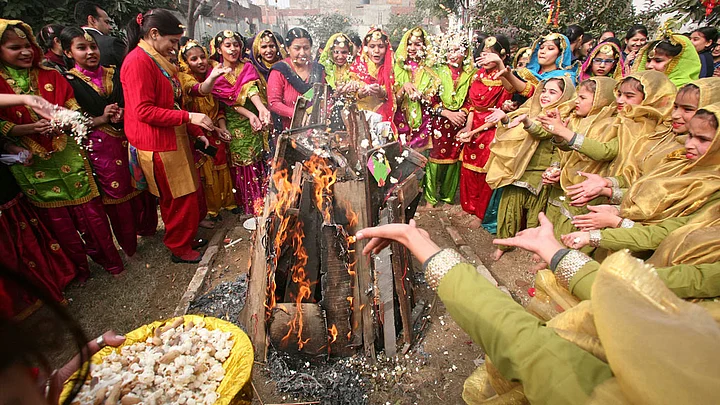Lohri 2018 is one of most popular and revered Punjabi festivals celebrated in India with great ritualistic fervour. With the new year here and the onset of the harvest season, the auspicious festival is set to be celebrated on 13 January. The festival pays homage to Surya (the sun god), hoping that the god graces the occasion with his presence during the bumper harvest.
Celebrated with great pomp and enthusiasm, the festival marks the end of sowing season and the beginning of the farming season. Also known as the ‘harvest festival,’ the festivities are a way to solemnise harvesting of the rabi (winter) crops through traditional folk songs, dances and delectables.
The festival is primarily celebrated in northern states of India, including Punjab, Haryana, Delhi and Uttar Pradesh. Initially, it was celebrated on the shortest day and longest night of the year. Later, people started celebrating it at the end of the chilly winters.
But what is special about the colourful and vibrant festivities? What sets Lohri apart from the others? Here is a quick glimpse at the history of the festival.
Why Is Lohri Celebrated?
Lohri festival holds great significance as it marks the harvesting season and commemorates the passing of the winter solstice. With the sowing season ending, rabi crops are set to be harvested during this time. The festival celebrates the ancient tradition of lighting of a holy fire that signifies the fire god or Agni.
Devotees circle around the bonfire and sing in praise of Surya. The festival celebrations coincide with the festival of Bhogali Bihu of Assam and Pongal in Tamil Nadu.
When Is Lohri Celebrated?
According to the Indian calendar, Lohri falls in the month of Pausha. But the Gregorian calendar mentions the date as 13th of January. The festival is observed a day before the kite flying festival of Makar Sankranti, also known as Maghi that welcomes the onset of summer.
The festival day is touted to be the longest night of the year in the lunar calendar. According to the solar part of the lunisolar Bikrami calendar, the festival is typically celebrated on the same date every year. During the leap years, Lohri is celebrated on either 12 or 14 of January.
How Is the Festival Celebrated?
The festival of Lohri is celebrated as a community festival with family, friends, and relatives. People gather around bonfires that are lit in front of people’s houses or in harvested fields and toss corn, sesame seeds, rice and jaggery into the bonfires. The occasion is considered to be auspicious for to-be-parents and newly married couples. After the fire is set ablaze, people sing and dance to traditional folk songs in praise of Surya, symbolised by the bonfire.
Children recite songs in praise of Dulha Bhatti and cajole elders for money. People worship the bonfire and pray for abundant crops by saying ‘Adar aaye dilather jaaye’. Many people wish for prosperity as they toss the food items in fire. Bhangra and gidda are performed at the occasion.
After the bonfire rituals, people exchange greetings with loved ones and dance around the bonfire distributing prasad.
What Is the Traditional Feast of Lohri?
The traditional feast on the festival includes popcorns, peanuts, ladoos, phulle, gajak, and jaggery. The food items are fed into the bonfire for auspicious reasons. According to legends, praying to Agni brings peace, prosperity and positivity to people’s lives and marks the end of evil. The traditional dinner served after the prayers, includes Punjabi delectables like Sarson ka Saag and Makki ki Roti.
(With inputs from NDTV, India.com, Pressks.com)
(We Indians have much to talk about these days. But what would you tell India if you had the chance? Pick up the phone and write or record your Letter To India. Don’t be silent, tell her how you feel. Mail us your letter at lettertoindia@thequint.com. We’ll make sure India gets your message.)
(At The Quint, we question everything. Play an active role in shaping our journalism by becoming a member today.)
